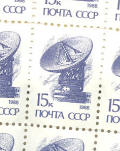RIKLBLOG |
| Tomorrow |
| 24 April 2006 |
| Yesterday |
| Index |
| Eventide |
| SETI League |
| PriUPS Project |
| Bonus! |
| Contact |
The Great Kopeck Caper
Part 2, The Scheme
The international postal system has got to be a bureaucracy whose scope and majesty is akin to that of the United Nations. In fact, it may even be part of the UN, although finding out would violate my rule against research. The fact that you can deposit a small piece of paper with gaily colored stamps in a postal system input buffer on your corner and have it delivered to almost anyone, anywhere in the world, for the price of one patty in a McDonalds Double Cheeseburger has got to be a major accomplishment of our civilization. The price is not a universal one, however. Each country has its own rates, established by the postal bureaucracy, and they can be prohibitive. Even if the price is similar in dollar-exchange, a local citizen might have to work a full day to mail a postcard to mommy. Needless to say, this discourages frivolous mailings.
Back in the 1980's, when I was working on my Oblast Award, Soviet hams were numerous and communicative. Although things were decidedly odd in the old CCCP, they weren't so bad that people couldn't send postcards by one means or another. We used QSL "bureaus" which were cooperative ventures set up by hams in various countries to exchange cards. But as the easy oblasts succumbed to my efforts, it became more difficult to get cards, and I started using self-addressed, stamped envelopes to make it easier for the sender.
I had a friend who traveled to Moscow often, and I petitioned her to pick up some mint stamps that I could use. When I had to repay her for the stamps, I was astonished to find out how little they cost. The price of an international mailing was 50 kopecks, or half a ruble. Although this superficially corresponded to USA rates, about 50 cents, the number of rubles you could buy for a US dollar was on the increase. The official exchange rate was close to one-to-one, but a savvy tourist could buy five or ten for a dollar. Therefore, the cost of my 50-kopeck stamp was about a dime, maybe less. This was quite the deal. But wait - there's more.
As the CCCP was on its way to the dustbin, the old ruble wasn't far behind. Eventually one dollar would fetch over a hundred rubles. International postage was, in effect, free. (The obvious question: why didn't postage rates go up along with the price of everything else, can be answered with the catchphrase "bureaucratic inertia." Of course, eventually it did, but what a window of opportunity!)
<FICTION>Recognizing this anomaly, I contacted my friend (of the stamp-purchasing persuasion) and asked her to try to set up a mailing house in Moscow. My part was to solicit bulk mailers with an interesting proposition: Instead of sending junk mail with bulk indicia that every United States recipient would immediately discard, why not send your mailing piece from the USSR? People would receive your mailing, with gorgeous stamps from Russia or one of the republics, and be so intrigued that they would actually open the mailing piece. What would we charge? Get this: The same amount it would cost to mail from the USA! Well, of course this was an irresistible offer, and major mailers instantly took advantage, using us to send thousands of metric tonnes of junk mail (with beautiful stamps) from Omsk and Tomsk and Minsk and Pinsk. The recipients responded so well that the mailers were thrilled, and my friend and I made a fortune, since the mailings literally cost us a penny or so each. It was only when, after the postal rates finally caught up with the ruble inflation, that we had to shut down the operation. Sadly, we were both shot and killed by the KGB while trying to leave the country. They never explained why!</FICTION>
I used the standard hypertext "I'm lying" tags for the above paragraph because I did no such thing. However I'm proud to have even thought of it contemporaneously. Most of my get-rich-quick schemes are either hindsight or far too complicated and fraught with risk, such as relying on humans to behave as I would like them to. This scheme would actually have worked, at least for a time. I'm almost disappointed that I didn't try it, a disappointment ameliorated by the fact that I remain extant, at least more so than does the KGB.
| © 2006 |
| Richard Factor |
